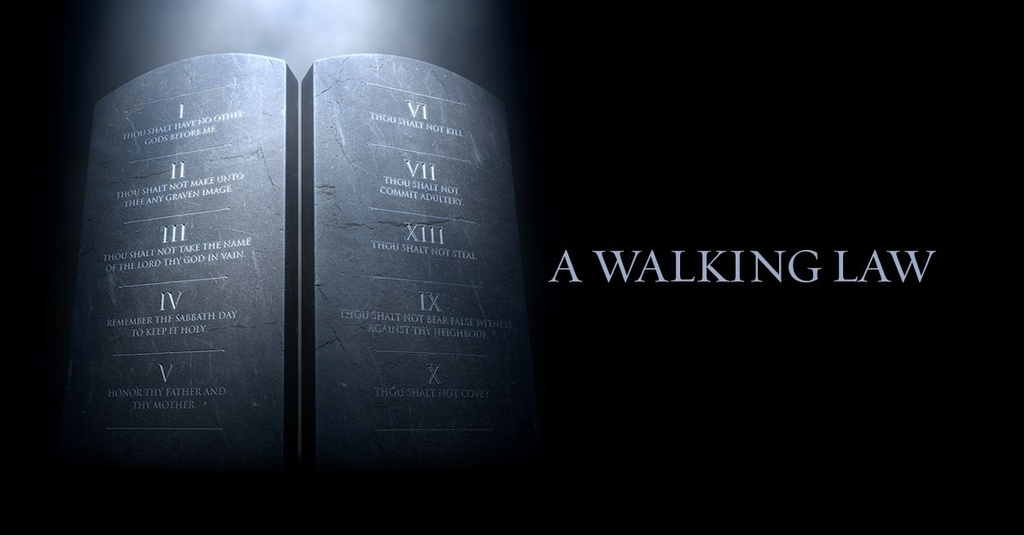
A Walking Law
When we are renewed, the law is written upon our hearts and minds and is no longer isolated to page or stone. But God does even more. He puts His Spirit within us to cause us to walk in His statutes and keep His judgments.

- Chalcedon Editorial
Biblical law is addressed to covenant man and his family. It requires every man to be a walking law in his sphere of life, governing himself and exercising dominion under God in his domain.[1]
We know that much of the church is averse to Biblical law to the degree that it’s almost deemed a heresy because it wars against their loose idea of grace. Law and grace cannot be reconciled, so they believe, and nothing opposes the “Spirit-led” life like the idea that Old Testament law is valid for today. Law is a greater threat to their spirituality than the flesh!
Ample volumes exist which dismantle the antinomian position, but a point often neglected is the fact that God’s law is actually at the heart of regeneration in the New Covenant. Since the people of Israel failed because they could not keep the law, a new way was declared:
For finding fault with them, he saith, Behold, the days come, saith the Lord, when I will make a new covenant with the house of Israel and with the house of Judah. (Heb. 8:8)
God sought for a new covenant because the people were the problem. Therefore, the New Covenant had to focus on changing the people, but the nature of the change was not simply a change of nature. It was a writing of the very law they could not keep on their hearts and minds:
For this is the covenant that I will make with the house of Israel after those days, saith the Lord; I will put my laws into their mind, and write them in their hearts: and I will be to them a God, and they shall be to me a people. (Heb. 8:10)
The New Covenant is very much focused on the law because disobedience was the problem under the Old Covenant. And this law is not simply written in the heart and mind of a high priest or king. It’s written within the hearts and minds of all God’s people which makes it a better covenant:
But now hath he obtained a more excellent ministry, by how much also he is the mediator of a better covenant, which was established upon better promises. (Heb. 8:6)
Keep and Do God’s Statutes and Judgments
The prophet Ezekiel is told something similar when God says:
A new heart also will I give you, and a new spirit will I put within you: and I will take away the stony heart out of your flesh, and I will give you an heart of flesh. And I will put my spirit within you, and cause you to walk in my statutes, and ye shall keep my judgments, and do them. (Ezek. 36:26-27)
What are the judgments we are to keep and do? It’s the judgments of God as found in His law. In other words, life and society are filled with problems, injustices, and decisions that require judgment to resolve. Are we to be our own gods determining good from evil, or are we to follow the written judgments of God on all matters of life? The moral decision is already determined by God, and the duty of the believer is to follow God’s judgments about every matter requiring judgment.
This makes us, as Rushdoony described, a “walking law” in every sphere of life. With regeneration, our stony hearts are removed, and new hearts are given. When we are renewed, the law is written upon our hearts and minds and is no longer isolated to page or stone. But God does even more. He puts His Spirit within us to cause us to walk in His statutes and keep His judgments. He does all this while there’s no mention of heaven. The salvation prophesied has to do with the New Covenant realities within time and history—with eternity to follow.
Shining Our Light in the World
This is a grand vision for both the church and the individual believer, but we need this greater reality to redefine our life now—walking in the awareness that we are God’s law in fleshly form working out our own salvation with fear and trembling (Phil. 2:12).
Christ Himself is the law-word of God incarnate, and Christ is in us which gives us the hope of glory (Col. 1:27). Until that time, God desires our obedience but also the application of that very law-word to every sphere of life. Even with Israel, God wanted His law to be “seen” by those outside the covenant community:
Behold, I have taught you statutes and judgments, even as the Lord my God commanded me, that ye should do so in the land whither ye go to possess it.
Keep therefore and do them; for this is your wisdom and your understanding in the sight of the nations, which shall hear all these statutes, and say, Surely this great nation is a wise and understanding people.
For what nation is there so great, who hath God so nigh unto them, as the Lord our God is in all things that we call upon him for?
And what nation is there so great, that hath statutes and judgments so righteous as all this law, which I set before you this day? (Deut. 4:5-8)
How can the nations learn about God’s law? They learn by seeing it lived out by a covenant community. Otherwise, it’s merely moral theory. The law must be lived and the judgments of God must be applied. Our Lord says the same thing when He calls for our good works to be seen of men:
Let your light so shine before men, that they may see your good works, and glorify your Father which is in heaven. (Matt. 5:16)
The good works are to be seen, and therefore those good works are our light, but those good works are simply God’s law lived out. It’s interesting then that the following verses speaks directly to the theonomic argument for God’s law:
Think not that I am come to destroy the law, or the prophets: I am not come to destroy, but to fulfil. For verily I say unto you, Till heaven and earth pass, one jot or one tittle shall in no wise pass from the law, till all be fulfilled. (Matt. 5:17-18)
The New Covenant is about the creation of a new people whom God makes into walking laws, and in this way, God’s law is gradually fulfilled and we see God’s covenant blessings within time and history.
God has done His part, and it’s always time we do ours.
[1] R. J. Rushdoony, Sovereignty (Vallecito, CA: Ross House Books, 2007), p. 31.

- Chalcedon Editorial